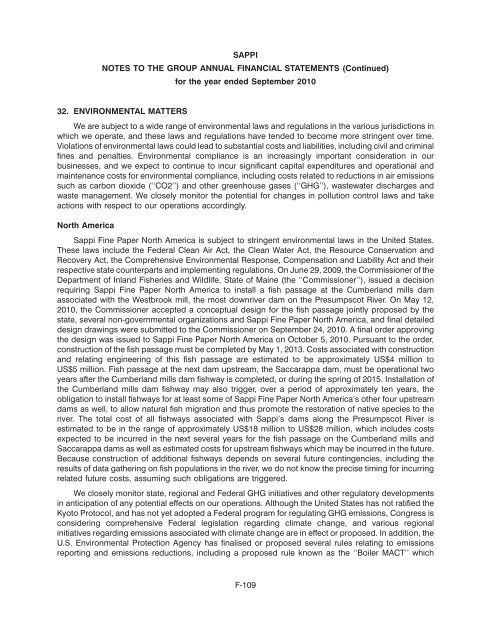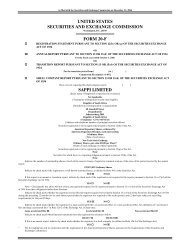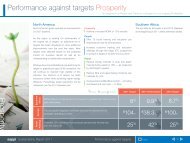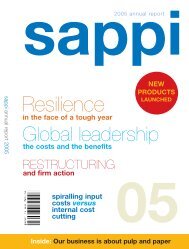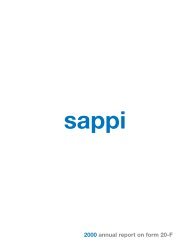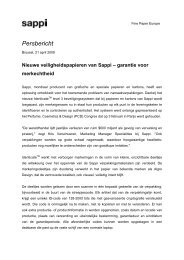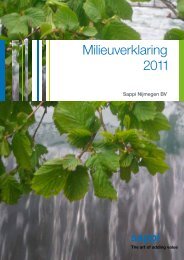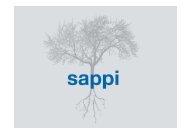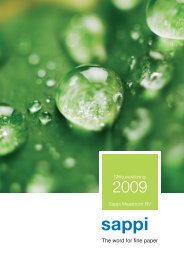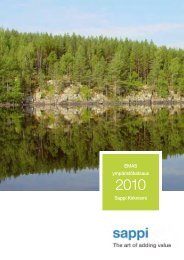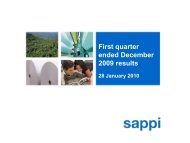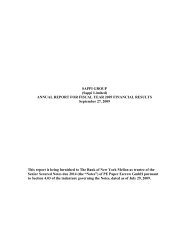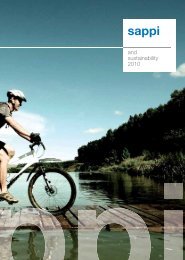Create successful ePaper yourself
Turn your PDF publications into a flip-book with our unique Google optimized e-Paper software.
<strong>SAPPI</strong><br />
NOTES TO THE GROUP ANNUAL FINANCIAL STATEMENTS (Continued)<br />
for the year ended September 2010<br />
32. ENVIRONMENTAL MATTERS<br />
We are subject to a wide range of environmental laws and regulations in the various jurisdictions in<br />
which we operate, and these laws and regulations have tended to become more stringent over time.<br />
Violations of environmental laws could lead to substantial costs and liabilities, including civil and criminal<br />
fines and penalties. Environmental compliance is an increasingly important consideration in our<br />
businesses, and we expect to continue to incur significant capital expenditures and operational and<br />
maintenance costs for environmental compliance, including costs related to reductions in air emissions<br />
such as carbon dioxide (‘‘CO2’’) and other greenhouse gases (‘‘GHG’’), wastewater discharges and<br />
waste management. We closely monitor the potential for changes in pollution control laws and take<br />
actions with respect to our operations accordingly.<br />
North America<br />
Sappi Fine Paper North America is subject to stringent environmental laws in the United States.<br />
These laws include the Federal Clean Air Act, the Clean Water Act, the Resource Conservation and<br />
Recovery Act, the Comprehensive Environmental Response, Compensation and Liability Act and their<br />
respective state counterparts and implementing regulations. On June 29, 2009, the Commissioner of the<br />
Department of Inland Fisheries and Wildlife, State of Maine (the ‘‘Commissioner’’), issued a decision<br />
requiring Sappi Fine Paper North America to install a fish passage at the Cumberland mills dam<br />
associated with the Westbrook mill, the most downriver dam on the Presumpscot River. On May 12,<br />
2010, the Commissioner accepted a conceptual design for the fish passage jointly proposed by the<br />
state, several non-governmental organizations and Sappi Fine Paper North America, and final detailed<br />
design drawings were submitted to the Commissioner on September 24, 2010. A final order approving<br />
the design was issued to Sappi Fine Paper North America on October 5, 2010. Pursuant to the order,<br />
construction of the fish passage must be completed by May 1, 2013. Costs associated with construction<br />
and relating engineering of this fish passage are estimated to be approximately US$4 million to<br />
US$5 million. Fish passage at the next dam upstream, the Saccarappa dam, must be operational two<br />
years after the Cumberland mills dam fishway is completed, or during the spring of 2015. Installation of<br />
the Cumberland mills dam fishway may also trigger, over a period of approximately ten years, the<br />
obligation to install fishways for at least some of Sappi Fine Paper North America’s other four upstream<br />
dams as well, to allow natural fish migration and thus promote the restoration of native species to the<br />
river. The total cost of all fishways associated with Sappi’s dams along the Presumpscot River is<br />
estimated to be in the range of approximately US$18 million to US$28 million, which includes costs<br />
expected to be incurred in the next several years for the fish passage on the Cumberland mills and<br />
Saccarappa dams as well as estimated costs for upstream fishways which may be incurred in the future.<br />
Because construction of additional fishways depends on several future contingencies, including the<br />
results of data gathering on fish populations in the river, we do not know the precise timing for incurring<br />
related future costs, assuming such obligations are triggered.<br />
We closely monitor state, regional and Federal GHG initiatives and other regulatory developments<br />
in anticipation of any potential effects on our operations. Although the United States has not ratified the<br />
Kyoto Protocol, and has not yet adopted a Federal program for regulating GHG emissions, Congress is<br />
considering comprehensive Federal legislation regarding climate change, and various regional<br />
initiatives regarding emissions associated with climate change are in effect or proposed. In addition, the<br />
U.S. Environmental Protection Agency has finalised or proposed several rules relating to emissions<br />
reporting and emissions reductions, including a proposed rule known as the ‘‘Boiler MACT’’ which<br />
F-109


